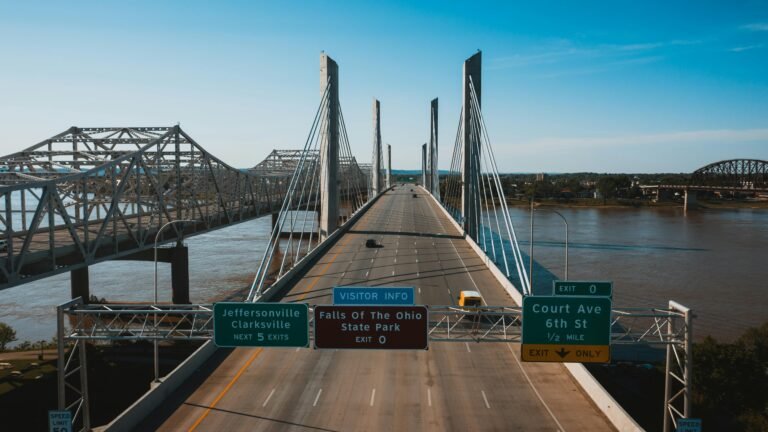The American heartland is often spoken of in broad strokes—rolling farmland, small towns, interstates stretching past fields of corn and soybeans. Yet traveling through Ohio, Kentucky, and Indiana by car shows how these three states hold more than flat images of the Midwest and South.
They form a region where heritage, industry, and nature all intersect, and where a road trip unfolds as a sequence of contrasts: river cities and country lanes, bourbon trails and covered bridges, football stadiums and quiet limestone caverns.
Setting Out: Why the Heartland Calls
Driving through these states feels different than passing along the coasts. Distances are shorter, communities are closer together, and the shifts in landscape happen quickly. One morning can begin in the urban sprawl of Cincinnati and by lunch find you in horse country or Amish farmland.
This is a road trip that favors detours, local signs, and the slower pace of backroads.
Ohio: From Urban Energy to Countryside Calm
Ohio presents itself as both industrial and green, modern and traditional. The road trip begins here because it offers a natural entry point: large cities with clear links to smaller towns.
Cincinnati’s Riverfront and Over-the-Rhine
Cincinnati sits on the banks of the Ohio River with its bridges tying the state to Kentucky. The riverfront area has been revitalized with parks, walking paths, and stadiums. North of downtown, Over-the-Rhine stands as one of the most complete collections of 19th-century architecture in the United States, now filled with breweries, markets, and restaurants.
For families, the Cincinnati Zoo and Botanical Garden makes a strong stop without pulling the trip off course.
Columbus and the Pull of the Arts
Columbus is more than the capital—it is a city built around a university culture and creative industries. The Short North Arts District offers galleries and murals, while the Scioto Mile along the riverfront gives open-air space for walking or cycling. Those traveling with children can pause at COSI, a science museum designed to engage younger minds without overwhelming adults.
Small Town Ohio
Moving away from the cities, towns like Granville and Yellow Springs slow the pace. Independent shops, craft markets, and countryside views all carry an ease that balances the urban portions of the journey. Here, the rhythm shifts to porches and community squares rather than highways and towers.
Kentucky: Bluegrass, Bourbon, and Deep History
Crossing the Ohio River into Kentucky changes the mood immediately. Rolling hills stretch into view, and signs for distilleries begin to appear almost as frequently as church steeples.
Louisville and Its Dual Identity
Louisville carries both Southern charm and Midwestern pragmatism. The Kentucky Derby grounds at Churchill Downs are an anchor, but so are the bourbon distilleries and urban parks. Downtown, Whiskey Row has been restored, while the Big Four Bridge offers pedestrians a way to walk between Kentucky and Indiana across the Ohio River.
For children, the Louisville Slugger Museum brings baseball history to life with giant bats and interactive displays.
Lexington and Horse Country
Lexington is surrounded by horse farms that define the Bluegrass identity. Visitors can tour stud farms and racetracks that link the region to an international industry. The Kentucky Horse Park blends museum and working farm, offering a setting where adults and children alike can see the heritage of thoroughbreds up close.
The Bourbon Trail
Kentucky’s Bourbon Trail winds through towns and countryside alike. Distilleries such as Maker’s Mark, Woodford Reserve, and Buffalo Trace open their doors to travelers, and while tasting is for adults, the grounds and history provide atmosphere that anyone can appreciate.
Families often break the day with a stop at small-town diners that dot the trail, adding a sense of community alongside the iconic drink.
Indiana: Crossroads of Industry and Quiet Beauty
Indiana carries the title “Crossroads of America,” and it earns the name with roads that crisscross farmland, factories, and historic towns.
Indianapolis and the Circle City
Indianapolis blends its identity as the state capital with its role as a hub of motorsport. The Indianapolis Motor Speedway is more than an event site—it is a museum of speed and engineering. Downtown’s Monument Circle stands as a civic centerpiece, ringed with shops and offices.
Families find the Children’s Museum of Indianapolis a highlight, the largest of its kind in the country, balancing the adult-oriented stops with something designed entirely for younger travelers.
Covered Bridges and Rural Indiana
Parke County is known as the Covered Bridge Capital of the World. Driving through its backroads reveals dozens of preserved wooden bridges spanning creeks and rivers, many of them surrounded by rolling farmland.
The bridges create a rhythm of entry and exit, each one a brief tunnel of shade that frames the landscape. Small towns nearby hold festivals and markets that keep the traditions alive.
Natural Caves and Waterways
Southern Indiana holds limestone caves and the Ohio River shoreline. Marengo Cave, a U.S. National Landmark, allows visitors to walk through underground chambers carved over millennia. Above ground, state parks like Brown County offer hiking, cycling, and autumn foliage that rivals New England.
Families find both settings flexible: adventurous children enjoy the caves, while parks provide room for less structured play.
The Road Itself: Linking the States
The true strength of this journey is the drive. Distances are manageable, rarely more than a few hours from one major stop to the next. Country roads carry as much reward as interstates, often leading past farm stands, old barns, and roadside diners that have served generations.
Each state bleeds into the next without a sharp border in culture, yet distinct differences remain: Ohio’s balance of industry and green space, Kentucky’s heritage of bourbon and horses, Indiana’s mix of speed and quiet countryside.
Small-Town Pauses Along the Way
Between cities, the smaller communities shape the trip just as strongly. In Ohio, towns like Marietta with its brick streets along the Muskingum River preserve a riverboat legacy. In Kentucky, Bardstown frames bourbon history with colonial architecture.
In Indiana, Madison sits on the Ohio River with a historic district that blends Federal-style houses and a working downtown. None of these towns need more than a few hours, but each adds depth that prevents the journey from slipping into a blur of highways.
Ending the Journey
Reaching the end of a road trip through Ohio, Kentucky, and Indiana does not feel like crossing a finish line. It feels instead like closing a loop: a circuit through the heart of a region that is often overlooked yet carries a weight of culture, history, and landscape.
The impression left behind is not of a single attraction or city but of a collection of moments—walking a covered bridge, tasting bourbon straight from the barrel, hearing a child laugh in a museum designed for exploration, watching the river move past at dusk.
The heartland does not demand attention. It earns it slowly, by being exactly what it is. And for those who take the time to drive through, the memory of that unforced authenticity is what lasts.


































